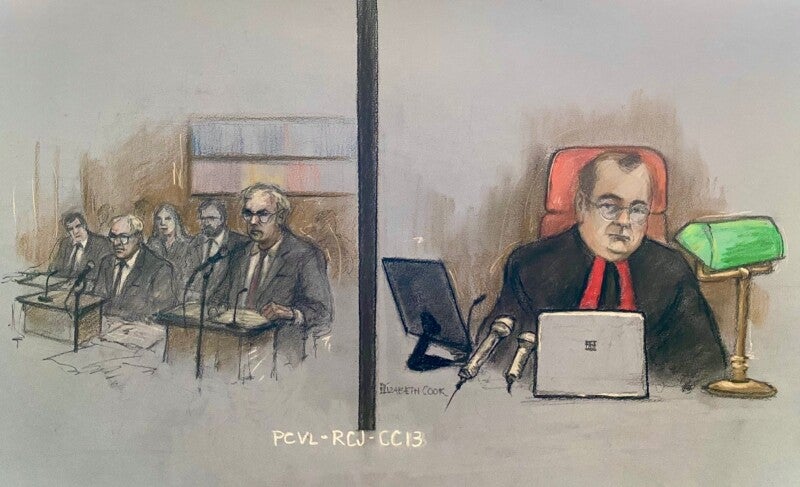
A lawyer for the Mail on Sunday accused Prince Harry of “straitjacketing” the newspaper’s “right to comment” during the pair’s latest libel fight.
Harry is suing Mail on Sunday and Mail Online publisher Associated Newspapers and seeking damages and an injunction over a February 2022 article headlined: “EXCLUSIVE: How Prince Harry tried to keep his legal fight with the government over police bodyguards a SECRET… then – just minutes after the story broke – his PR machine tried to put a positive spin on the dispute.”
In July, High Court judge Mr Justice Nicklin ruled parts of the article were defamatory because they contended Harry intended to mislead the public.
He said a reader would think Harry “was responsible for public statements, issued on his behalf, which claimed that he was willing to pay for police protection in the UK, and that his legal challenge was to the Government’s refusal to permit him to do so, whereas the true position, as revealed in documents filed in the legal proceedings, was that he had only made the offer to pay after the proceedings had commenced”.
He also said the article would have been read as alleging Harry “was responsible for trying to mislead and confuse the public as to the true position, which was ironic given that he now held a public role in tackling ‘misinformation’”.
Associated Newspapers is defending the case on the basis of honest opinion under the Defamation Act 2013, arguing Mail on Sunday assistant editor Kate Mansey was approaching the points in her piece as an “honest commentator”.
However lawyers for Prince Harry are attempting to have this defence dismissed, or a summary judgment in his favour given, on the grounds that the newspaper’s case is not strong enough to succeed at trial.
Andrew Caldecott KC, representing Associated Newspapers, told the High Court on Friday that in fact the publisher’s case was a “strong” one and called the stance of Harry’s legal team on multiple aspects “wholly unreasonable”. He claimed “this whole case is built on sand”.
He also contended that it was fact that Harry had not offered to pay for his security in the UK until after launching his application for a judicial review.
“The truth was that no offer to pay had been made to the Home Office before the issue of proceedings,” Caldecott told the High Court. “… it must follow as night does day that the claimant was not challenging a prior decision by the Home Office not to allow him to pay but the Home Office had not received an offer to pay before the proceedings commenced.”
However Justin Rushbrooke KC, representing Harry, said in written argument that the newspaper was “incapable of proving that [Harry] had only made an offer to pay for police protection after the judicial review proceedings had commenced, let alone that the documents filed in those proceedings revealed this to be the case”.
Caldecott also claimed Harry’s legal team had “fundamentally distort[ed]” the meaning given by the judge last year in its arguments, having the “effect of straitjacketing the newspaper’s right to comment”.
Rushbrooke argued in response that they were “not editing” the meaning but they did disagree about what it “has to say”.
Rushbrooke had said “there can be no doubt that the factual allegations relied upon for the defamatory opinion, they essentially break down into two components”: the first “relates to a false claim being made by the claimant or on his behalf about his willingness to pay for police protection in the UK” while the second to a “false claim as to the nature of the legal challenge”.
“If the defence does not even purport to show that [Harry’s] willingness [to pay] is true, then the defence can go nowhere in terms of supporting the objective honesty test,” Rushbrooke said. “We say that that is so as a matter of principle… and as a matter of common sense and fairness.”

Caldecott, for the Mail on Sunday, claimed in his written argument that Mansey’s email to a representative of Harry before the article was published contained some “pertinent” questions. “There may be no obligation to reply to them but an honest commentator is entitled to look at the absence of reply,” he said.
In court documents, Rushbrooke claimed that other press reporting of Harry’s statement about the judicial review in January 2022 “manifestly did not state, nor did they imply, that [his] legal challenge was to the Government’s decision to refuse his offer to pay for police protection”.
However Caldecott wrote in response: “If that is so, one is entitled to ask why the gist of the headlines and opening text of numerous reputable media entities who covered the public statements is to precisely this effect.”
He told the court it would be “extraordinary if large swathes of the media had a collective misreading of the press statement”. Rushbrooke claimed PA had got the “wrong end of the stick” but Caldecott said the agency got the “right end”.
PA had written in January 2022: “The Duke of Sussex has filed a claim for a judicial review against a Home Office decision not to allow him to personally pay for police protection for himself and his family while in the UK.” A BBC story said: “Prince Harry is seeking a judicial review against a refusal of the Home Office to allow him to personally pay for police protection when in the UK.”
And Omid Scobie, a journalist seen as being sympathetic to the Sussexes according to Rushbrooke, tweeted: “BREAKING: Prince Harry has applied for a judicial review of a Home Office decision not to allow him to personally pay for police protection for himself and his family when they are in the UK, a legal representative for the Sussexes confirms.”
Harry has not claimed these reports were “inaccurate” or “unfair” reports of his public statements, and has made no effort to correct the record to this day, according to Caldecott.
Caldecott said: “The Press Association were entirely right to think this is the punchy summary of what it’s all about. It’s simple – the duke wants himself and his family to be safe and to pay for necessary security but he can’t – unless the Home Office approves his offer.”
The Mail on Sunday itself reported this statement in full after breaking the news of the judicial review. Mansey later, in a request for comment email, provided an opportunity to “consider and correct the inaccuracies in the reporting elsewhere” by highlighting PA’s story and noting that its claim was not in the statement that had been provided to her, but she got no response, the newspaper’s argument said.
That January statement to the press ended with an apparent reference to the Mail on Sunday: “It is due to a leak in a UK tabloid, with surreptitious timing, we feel it necessary to release a statement setting the facts straight,” it said.
However Caldecott told the court Mansey’s email requesting comment “had put a very fair… summary of what the judicial review proceedings were about” and that “people are plainly entitled to ask questions” about Harry’s application.
The judge’s decision will come at a later date.
Email pged@pressgazette.co.uk to point out mistakes, provide story tips or send in a letter for publication on our "Letters Page" blog
